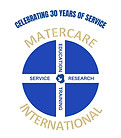MCI Publications
Above you will find downloadable official publications from the MaterCare International head office in St. John's, Newfoundland.
All materials found here are available for reproduction with source credit given to MCI. For additional materials, please contact us.
The State of Maternal Health in Developing Countries:
Mothers and their unborn children suffer considerable discrimination in our times. This is the conclusion that one must draw from an examination of current rates of abortion, and maternal mortality and birth injury (maternal morbidity), especially in the developing world.
In poor parts of the world, mothers, are experiencing "unimaginable suffering." It is estimated that 600,000 die annually during pregnancy and labour. The risk of a mother dying as a direct cause of pregnancy and labour in Africa is 1 : 13, compared to 1 : 7,300 for example in Canada. The executive director of UNICEF commented in a June 1996 report, The Progress of Nations : " It is no exaggeration to say that this is one of the most neglected tragedies of our times, when 1,600 mothers - some in their teens - die every day."
The UNICEF report however, failed to mention, the unimaginable suffering of millions of unborn children, killed in their mothers womb and the suffering of millions of mothers who resort to abortion as a solution to their poverty; over 50 million annually, world-wide. Most of these maternal deaths and injury and all of the abortions are readily preventable. UNICEF points to the basic reasons for the lack of improvement in maternal death rates in the developing world as " a conspiracy of silence " and " a lack of imagination " to which should be added, a "lack of love and compassionate services" to explain the abortion deaths.
Maternal deaths do not take place in a visible and concentrated way, but occur among very young mothers, in small villages, and a few at a time. Most die in terror from haemorrhage or in agony from obstructed labour as their pelvises are too small. Not only are the lives of these mothers abruptly terminated but the chances of survival of their new-borns and the two or more children that they already have and leave behind, decreases dramatically. It is also very likely that their families disintegrate in the aftermath of their death.
Sadly, these deaths only represent the tip of the iceberg. It is estimated that for every mother that dies, 30 more suffer long-term damage to their health, most frequently from obstetric fistulae. These arise in very young mothers, aged between 14 and 20 years, as a consequence of unrelieved obstructed labour, and frequently also from cultural practices e.g. female circumcision. The result is that the baby dies and because of damage to the bladder, rectum and vagina, the mother becomes incontinent of urine and/or faeces (obstetric fistulae). She thus becomes a complete outcast and is treated worse than a leper by her husband, family and society, simply because she is wet, filthy and foul-smelling. They suffer pain, humiliation, and lifelong debility if not treated. There are estimated to be 500,000 - 1 million women, mostly in sub-sahelian Africa who are suffering the consequences of a fistula.
These high rates of mortality, morbidity and abortion indicate neglect. Mothers in the developing world do not have access to safe, clean, dignified places to have their babies or access to expert medical services to look after them and while obstetric fistulae can be treated surgically, at present there are insufficient trained doctors, nurses or adequate facilities for that purpose. Unfortunately, the international safe motherhood initiative has accepted the current culture of death prevalent in obstetrics and gynaecology, as abortion is included as the solution to maternal health problems. All of this points to a real poverty - the lack of love and compassion.
The 1987 Safe Motherhood Conference in Nairobi first drew attention to the tragedy experienced by mothers in the developing world and issued a "call to action". However the response was not good enough and there have been repeated calls since without much response. The UNICEF report points to the basic reasons for lack of improvement in these deaths rates as “a conspiracy of silence" and a "lack of imagination".
